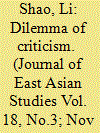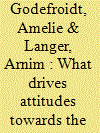| Srl | Item |
| 1 |
ID:
166146


|
|
|
|
|
| Summary/Abstract |
Recent literature claims that China censors information that has the potential to ignite collective action. This article extends this finding by arguing that Chinese censors respond differently to political challenges than they do to performance challenges. Political challenges call into questioning the Party's leading role, whereas performance challenges are directed at the failures of public goods provisions. A survey experiment of about 60 media professionals finds that censors are inclined to block political challenges and to tolerate criticism of the government's performance. However, when criticism contains both performance and political challenges, censorship is far more likely. By exploring the range of censorship activities, the results suggest that the Chinese regime's reliance on popular support constrains its censorship decisions.
|
|
|
|
|
|
|
|
|
|
|
|
|
|
|
|
| 2 |
ID:
192752


|
|
|
|
|
| Summary/Abstract |
Economic costs are a central political obstacle to investing in climate change mitigation and adaptation measures. Several studies now demonstrate that as costs increase, voters are less likely to support green initiatives. In this paper we argue that opposition to government green investments is conditional on the method of financing. Notably, because public debt shifts the burden of investments into the future, it may face less public opposition than broad based taxes that require an immediate sacrifice. To test this proposition, we fielded a preregistered conjoint survey experiment on nationally representative samples in one highly indebted (Italy) and one fiscally sound country (The Netherlands). We find debt financing increases voter support for green financing by up to 10 percentage points relative to broad-based taxes. However, we find carbon taxes and wealth taxes are most preferred. These findings demonstrate that credit market tools, like green bonds and debt for climate swaps, are likely politically efficient and not just economically efficient. Where investments are already financed with debt, the findings suggest that political communication can limit a political backlash to green investments. Most importantly, the findings show that the political opposition to paying for green investments can be circumvented.
|
|
|
|
|
|
|
|
|
|
|
|
|
|
|
|
| 3 |
ID:
190878


|
|
|
|
|
| Summary/Abstract |
Reintegrating ex-combatants back into society is one of the most challenging, yet fundamental components to building sustainable peace. While previous work has extensively evaluated the reintegration trajectories of ex-combatants, there is still little understanding of how citizens think about reintegration. In this article, we systematically analyze which former fighters people prefer to reintegrate into society. Based on theories of threat and justice, we develop a heuristic framework that explains how information about the motivations and behavior of ex-combatants shapes public preferences about whom to reintegrate. We test this framework using a conjoint experiment conducted among approximately 2,000 (former) university students in Nigeria. We find that our respondents are more forgiving towards former fighters who were forced to join the insurgency and expressed remorse afterwards, while being less willing to reintegrate more militant and less repentant offenders. Similar informational cues shape respondents’ evaluations of how successful the reintegration process would be and what punishment would be appropriate. Taken together, the results underscore the importance of perceptions of risk and fairness in driving attitudes towards reintegration. Finally, subgroup analyses revealed that these heuristics are broadly held across different demographic and conflict-related fault lines. While caution is warranted when generalizing these results, insights gained in this specific context are nonetheless an important step towards advancing our understanding of reintegration processes in conflict-affected countries.
|
|
|
|
|
|
|
|
|
|
|
|
|
|
|
|